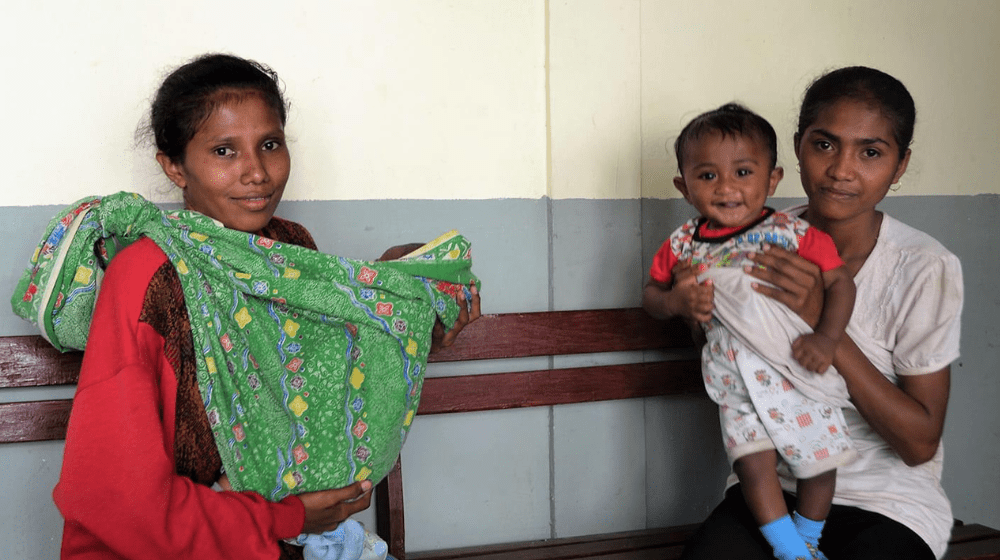The clarion call of the 2030 Agenda for Sustainable Development is to leave no one behind, and to reach those furthest behind first.
And while we have been making significant strides, we are yet to reach women like Aleta* and her family, on the outskirts of Dili, the capital of Timor-Leste.
Sustainable Development Goal (SDG) 5 on gender equality and the empowerment of all women and girls and SDG 3 on health and well-being must therefore continue to be at the centre of actions taken to achieve a prosperous, inclusive and sustainable future for the Asia-Pacific region.
While progress has been made, the dream to achieve gender equality and secure universal access to sexual and reproductive health remains elusive for many. Women and girls spend hours every day on unpaid care and domestic work, have limited access to sexual and reproductive health care and tragically, continue dying from pregnancy-related complications which are preventable. This highlights a fundamental contradiction in our societies: We have placed the least value on the most critical work for the survival of our economies, systems and societies and on women’s access to quality lifesaving maternal health care.
Aleta adds to the disheartening statistics of women and girls that carry the family upon their shoulders, subsidizing the market economy with unpaid labour – to the detriment of their own opportunities and capacities to shape our common future.
A whopping US$ 3.8 trillion could, in fact, be added to our economies if the invisible and unpaid care work of women was added into the GDP measurements in the Asia-Pacific region.
Following the COVID-19 pandemic, decades of progress on gender equality was reversed. Gender-based violence increased, the hours women and girls spend doing unpaid care work at home exploded and health care systems collapsed. Women forfeited paid jobs to assume unpaid responsibilities. With limited power to make decisions over household financial resources, accessing sexual and reproductive health care services reduced.
As of 2022, the Asia-Pacific region was falling behind its yearly target for the achievement of SDG3 on health. The region might take another 42 years to reach the SDG targets at current rates of progress. For maternal mortality, 13 countries in the Asia-Pacific region had a maternal mortality ratio (MMR) higher than 120 deaths per 100,000 live births in 2020, including countries like Viet Nam and Tonga - where rates had increased since 2005. In the rest of the region, annual rates of reduction have been too slow and below the 5 per cent per year required to ensure sustained progress towards the SDG target of 70 deaths per 100,000 live births. These latest UN estimates from 2023 do not yet account for the impact of COVID-19 on maternal mortality.
Aleta’s story is a tragic reminder of the inequalities faced by many women in the Asia-Pacific region and the impacts of the COVID-19 pandemic. During the pandemic, Aleta was not able to continue her informal employment due to her responsibilities at home, and due to her becoming pregnant with her 9th child. Her lack of finances and responsibility for care of the eight children at home meant Aleta did not seek the antenatal care she needed during the pregnancy. Tragically, Aleta went into labour at home without a skilled midwife and started bleeding heavily. Though they eventually rushed her and her baby to the health centre – it was too late. The loss of a mother is profound for any family. It is also a loss for our communities, societies and economies.
The pandemic has forced the region to rethink its priorities. It has shown that care and domestic work is essential to the health and functioning of a community. Governments must seize this moment to value unpaid care and domestic work, and to invest – from care services and infrastructure, social protection including universal health coverage schemes to prevent out of pocket expenditure for women seeking reproductive health services as well as employment-related care policies. Health systems also need to be strengthened to become more resilient to potential shocks from pandemics, climate-related disasters and conflicts.
If Aleta had benefited from a social protection safety net and formalized employment, she could have been covered by an insurance scheme that would have allowed her to access care during her pregnancy and birth with skilled professionals in a health facility where her life and that of her baby could have been saved.
While significant work has started in the region, investments in health systems including in health workforce education, regulation, deployment and retention is critical. Life-saving drug and supply systems must be strengthened. Universal health coverage schemes must include sexual and reproductive health care services for all people. A framework must also be established to redistribute responsibilities, time and resources when it comes to unpaid work, so it is shared more equitably. This involves gender-responsive budgeting, paid sick leave and insurance benefits, social protection policies such as social and physical infrastructures, and a norm shift for men to share care responsibilities.
We must all work together to build back stronger and more gender-equal societies where no woman or girl will be left behind, and where no woman will die of preventable causes in pregnancy or birth. The time is now to make good on our pledge to deliver on the 2030 Agenda. We owe this to Aleta and to every other woman in our region.
*Aleta is a fictional name based on a true story.
***
Learn more about how ESCAP supports governments in the Asia-Pacific region to value and invest in the care economy.
Learn more about UNFPA’s work on improving maternal health in Asia and the Pacific.
The Seventh Asian and Pacific Population Conference, organized by ESCAP and UNFPA in Bangkok from 15—17 November 2023, will provide opportunities for policymakers, civil society and other stakeholders to discuss key population and development issues and share insights. The meeting outcome will provide the regional input to the global review of the Programme of Action of the International Conference on Population and Development at the 57th session of the Commission on Population and Development in 2024.

|
Channe Lindstrøm Oğuzhan Social Affairs Officer, SDD, ESCAP |

|
Catherine Breen Kamkong Sexual and Reproductive Health Rights Technical Advisor, UNFPA |


